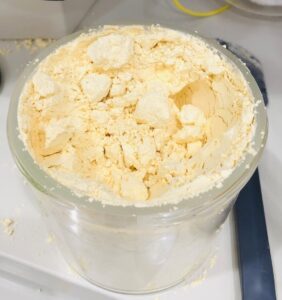Assoc. Prof. Sushil Dhital and his group carries fundamental and applied research on the structure-property-function-health relationships of food and food ingredients. The group’s stronghold and research interest are in relating plant molecular structures to macroscopic properties relevant to food, health, and product development. The team is made up of diverse background and uses cross-disciplinary approaches from physics, chemistry, biology, and engineering to tackle challenges that interest both the scientific and industrial community. They use various in-vitro and in-vivo models to elucidate the fundamental mechanisms beyond the nutritional and processing functionality of food and food ingredients.
With the central theme of relating structure-function-health relationship, the current research undertaken is closely aligned with the sustainable development goal, particularly in the areas of plant-based and alternative protein for meat and dairy substitutes, non-thermal processing, and the development of functional foods based on legumes.
RESEARCH PROJECTS
High value functional ingredients from bean processing waste, ARC Linkage project with Kraft Heinz Australia
This project aims to optimise bean processing and develop methods for isolation and utilization of valuable ingredients from bean processing waste that would otherwise end up in waste treatment facility. This is expected to be achieved using novel processing and recovery technologies that can be scaled up and adopted by wider industrial community.

Figure 1. Sensory Analysis of Beans with Kraft-Heinz and Monash Colleagues
High moisture extrusion of proteins in collaboration with Simplot Australia Pty Ltd.
This project aims to carry fundamental research to elucidate the effect of various ingredients (fat, starch, fibre) that go into high moisture extrusion process on texturization property of the high moisture meat analogue.

Figure 2. High Moisture Extrusion of soy-based formulation to form meat analogue.
Isolation and characterization of proteins from Australian lupin varieties in collaboration with Archer-Daniels-Midland (ADM), USA
The project aimed at optimising isolation and characterization of proteins from Australian Lupin varieties. Structural and functional characterization of lupin proteins because of varietal and processing differences were elucidated. The project was recently completed with one research paper published and another under revision.

Figure 3. Spray dried lupin protein isolate powder (protein content ~85%) prepared using optimized extraction and isolation process.
PUBLICATIONS
Shrestha, S., van’t Hag, L., Haritos, V. and Dhital, S., 2023. Rheological and textural properties of heat-induced gels from pulse protein isolates: Lentil, mungbean and yellow pea. Food Hydrocolloids, 143, p.108904.
Wu, C., Dhital, S., Mo, Y., Fu, X., Huang, Q. and Zhang, B., 2023. Salt adopted in soaking solution controls the yield and starch digestion kinetics of intact pulse cotyledon cells. Carbohydrate Polymers, 314, p.120949.
Li, H. and Dhital, S., 2023. Cereal Grains with Enhanced Nutrition Functional Components and Food Applications. Pandemics and Innovative Food Systems, pp.107-121.
Shrestha, S., van’t Hag, L., Haritos, V. and Dhital, S., 2023. Comparative study on molecular and higher-order structures of legume seed protein isolates: Lentil, mungbean and yellow pea. Food Chemistry, 411, p.135464.
Jia, B., Devkota, L., Sissons, M. and Dhital, S., 2023. Degradation of starch in pasta induced by extrusion below gelatinization temperature. Food Chemistry, p.136524.
Xiong, W., Devkota, L., Flanagan, B.M., Gu, Z., Zhang, B. and Dhital, S., 2023. Plant cell wall composition modulates the gut microbiota and metabolites in in-vitro fermentation. Carbohydrate Polymers, p.121074.
Wang, R., Li, M., Brennan, M.A., Dhital, S., Kulasiri, D., Brennan, C.S. and Guo, B., 2023. Complexation of starch and phenolic compounds during food processing and impacts on the release of phenolic compounds. Comprehensive Reviews in Food Science and Food Safety.
Dhakal, D., Younas, T., Bhusal, R.P., Devkota, L., Henry, C.J. and Dhital, S., 2023. Design rules of plant-based yoghurt-mimic: Formulation, functionality, sensory profile and nutritional value. Food Hydrocolloids, p.108786.
Li, C., Dhital, S. and Gidley, M.J., 2023. High-amylose wheat tortillas with reduced in vitro digestion and enhanced resistant starch content. Food Hydrocolloids, 137, p.108321.
Li, C., Dhital, S. and Gidley, M.J., 2023. High amylose wheat foods: A new opportunity to improve human health. Trends in Food Science & Technology.
Perera, D., Devkota, L., Garnier, G., Panozzo, J. and Dhital, S., 2023. Hard-to-cook phenomenon in common legumes: Chemistry, mechanisms and utilisation. Food Chemistry, p.135743.
Devkota, L., Kyriakopoulou, K., Bergia, R. and Dhital, S., 2023. Structural and Thermal Characterization of Protein Isolates from Australian Lupin Varieties as Affected by Processing Conditions. Foods, 12(5), p.908.
Perera, D., Kumar, G., Devkota, L. and Dhital, S., 2023. Bioactive Nutrient Retention during Thermal-Assisted Hydration of Lupins. Foods, 12(4), p.709.
Xiong, W., Zhang, B., Gu, Z., Muir, J. and Dhital, S., 2023. The microbiota and metabolites during the fermentation of intact plant cells depend on the content of starch, proteins and lipids in the cells. International Journal of Biological Macromolecules, 226, pp.965-973.
INDUSTRIAL PARTNERS
- Kraft Heinz Australia New Zealand
- Simplot Australia Pty. Ltd.
- Archer Daniels Midland (ADM), USA


